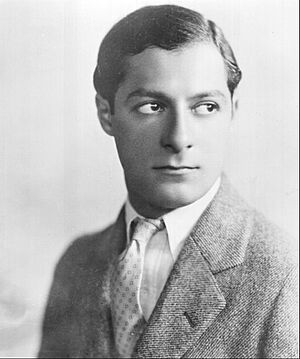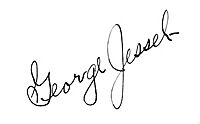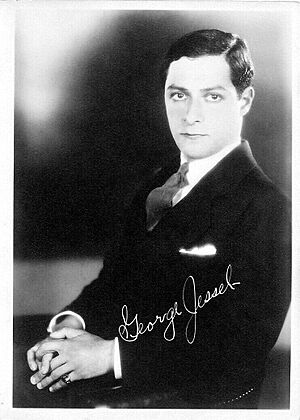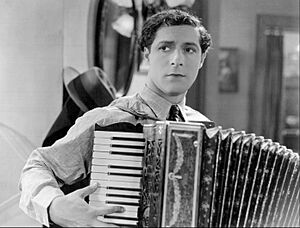George Jessel (actor) facts for kids
Quick facts for kids
George Jessel
|
|
|---|---|

Jessel c. 1926
|
|
| Born |
George Albert Jessel
April 3, 1898 New York City, U.S.
|
| Died | May 23, 1981 (aged 83) Los Angeles, California, U.S.
|
| Resting place | Hillside Memorial Park Cemetery, Culver City, California, U.S. |
| Other names | Georgie Jessel |
| Years active | 1909–1981 |
| Spouse(s) |
Florence Courtney
(m. 1923; div. 1932)Lois Andrews
(m. 1940; div. 1943) |
| Children | 2 |
| Signature | |
 |
|
George Jessel (born April 3, 1898 – died May 23, 1981) was an American actor, singer, and film producer. He was a very talented and funny entertainer. People knew him well, even though he didn't star in many movies. He was often called the "Toastmaster General of the United States." This was because he often hosted events for politicians and other famous people. Jessel first played the main role in the stage play The Jazz Singer.
Contents
Early Life and Start in Show Business
George Jessel was born on April 3, 1898, in Harlem, New York City. His parents, Joseph and Charlotte Jessel, were Jewish. When he was just 10 years old, George started performing. He appeared in vaudeville shows and on Broadway. He did this to help his family after his father, who was a playwright, passed away.
His mother worked at the Imperial Theater. She helped him create a singing group called The Imperial Trio. This group was made up of ushers, including Walter Winchell. They sang for people attending the theater. When he was 11, George worked with famous comedian Eddie Cantor. They performed together on stage until George got too old for the role at 16. Later, he performed with Lou Edwards and then became a solo artist.
George Jessel's Career
Vaudeville Shows
One of George Jessel's most famous comedy acts was called "Hello Mama." It showed a funny one-sided phone conversation. In 1919, he created his own show called George Jessel's Troubles.
Jessel also helped write the lyrics for a popular song. It was called "Oh How I Laugh When I Think How I Cried About You." He was in many successful comedy stage shows in the early 1920s. In 1921, he released a popular song called "The Toastmaster."
Movies and Radio
Jessel's first movie was a silent film called The Other Man's Wife (1919). In 1924, he appeared in a short comedy film. This film used a new sound technology called Phonofilm.
In 1925, George Jessel became a very popular actor on Broadway. He starred in the play The Jazz Singer. This play was a big hit. Because of its success, Warner Bros. wanted to make it into a movie. They wanted it to be the first "talkie" with speaking parts. They offered Jessel the main role. However, he asked for more money than the studio wanted to pay. So, Jessel turned down the movie role. The part eventually went to Al Jolson.
Jessel's next movie role was in Private Izzy Murphy (1926). After The Jazz Singer came out in 1927, Al Jolson's movie career took off. Jessel, however, continued to have smaller movie roles. These roles were often for audiences who enjoyed Jewish and other "ethnic" humor. In 1942, he became a member of The Lambs Theatre Club.
In the mid-1940s, Jessel started producing musicals for 20th Century Fox. He produced 24 films in total, working through the 1950s and 1960s. At the same time, he became well-known for hosting banquets. He was famous for his kind and witty jokes about other celebrities. In 1946, he helped start the California branch of the Friars Club. He also traveled around the world with the USO. He entertained soldiers serving in the military. As he got older, he wrote speeches to honor many of his friends in Hollywood who had passed away. He wrote three books about his life: So Help Me (1943), This Way, Miss (1955), and The World I Lived In (1975).
Some of the Hollywood films Jessel produced include The Dolly Sisters (1945) and Nightmare Alley (1947). He also produced Golden Girl (1951) and The I Don't Care Girl (1953).
In the early 1950s, he had his own radio show called The George Jessel Show. This show later became a television series from 1953 to 1954.
He also appeared as a guest on NBC's The Jimmy Durante Show. In 1968, he starred in Here Come the Stars, a TV variety show. However, his comedy style started to seem old-fashioned to some people. He also openly supported the American involvement in the Vietnam War. He also supported conservative political ideas. But he also spoke out for the civil rights movement. He criticized racism and anti-Semitism. His strong political views sometimes caused controversy.
In 1971, he was being interviewed on The Today Show. During the interview, he made a controversial comment about The New York Times. The interview was then ended early.
Later in his career, he had small roles in movies. These included a cameo as himself in Valley of the Dolls (1967). He also appeared in The Busy Body (1967) with Sid Caesar. He was in the musical Can Heironymus Merkin Ever Forget Mercy Humppe and Find True Happiness? (1969). He also had cameos in other films like The Phynx (1970) and Won Ton Ton, the Dog Who Saved Hollywood (1976).
Personal Life

George Jessel's personal life was often in the news during the 1930s. On May 2, 1930, Jessel married Florence Courtney. They divorced on October 24, 1932. On April 23, 1934, Jessel married silent movie star Norma Talmadge. This caused a stir because Talmadge had recently divorced her previous husband. After their divorce on August 11, 1939, he caused another incident at her house. In 1940, he married 16-year-old showgirl Lois Andrews. He was 42 at the time. They had a daughter named Jerrilyn before divorcing in 1942.
In 1961, actress Joan Tyler said Jessel was the father of her daughter Christine. Jessel later agreed he was Christine's father. He settled the case outside of court. As part of the agreement, Jessel paid child support.
Death
George Jessel passed away from a heart attack on May 23, 1981. He was 83 years old. He was buried at the Hillside Memorial Park Cemetery in Culver City, California.
Awards and Recognition
In 1969, the Academy of Motion Picture Arts and Sciences honored George Jessel. They gave him the Jean Hersholt Humanitarian Award. This is a special Academy Award for people who do a lot of charity work. George Jessel also has a star on the Hollywood Walk of Fame. It is located at 1777 Vine Street in Los Angeles.
Filmography
| Year | Title | Role | Notes |
|---|---|---|---|
| 1919 | The Other Man's Wife | Davy Simon | Lost film |
| 1926 | Private Izzy Murphy | Isadore "Izzy" Murphy / Patrick Murphy | Lost film |
| 1927 | Sailor Izzy Murphy | Izzy Murphy | Lost film |
| 1927 | Ginsberg the Great | Johnny Ginsberg | Lost film |
| 1928 | George Washington Cohen | George Washington Cohen | Lost film |
| 1929 | Lucky Boy | Georgie Jessel | |
| 1929 | Happy Days | Minstrel show performer #4 | |
| 1929 | Love, Live and Laugh | Luigi | |
| 1943 | Stage Door Canteen | Himself | |
| 1944 | Four Jills in a Jeep | Master of ceremonies | |
| 1953 | Yesterday and Today | Narrator | Voice |
| 1953 | The I Don't Care Girl | Himself | Uncredited |
| 1957 | Beau James | Himself | |
| 1959 | Juke Box Rhythm | Himself | |
| 1967 | The Busy Body | Mr. Fessel | |
| 1967 | Valley of the Dolls | MC Grammy Awards | |
| 1969 | Can Heironymus Merkin Ever Forget Mercy Humppe and Find True Happiness? | The Presence | |
| 1970 | The Phynx | Himself | |
| 1976 | Won Ton Ton, the Dog Who Saved Hollywood | Awards Announcer | |
| 1981 | Reds | Himself - Witness | |
| 2018 | The Other Side of the Wind | Himself | Final film role; filmed between 1970 and 1976 |
See also
 In Spanish: George Jessel para niños
In Spanish: George Jessel para niños
 | Sharif Bey |
 | Hale Woodruff |
 | Richmond Barthé |
 | Purvis Young |



